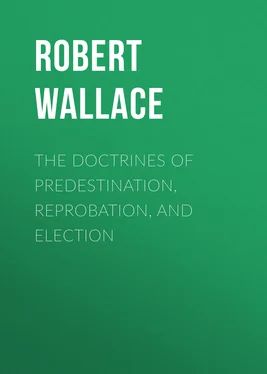Robert Wallace - The Doctrines of Predestination, Reprobation, and Election
Здесь есть возможность читать онлайн «Robert Wallace - The Doctrines of Predestination, Reprobation, and Election» — ознакомительный отрывок электронной книги совершенно бесплатно, а после прочтения отрывка купить полную версию. В некоторых случаях можно слушать аудио, скачать через торрент в формате fb2 и присутствует краткое содержание. Жанр: foreign_prose, foreign_religion, Философия, foreign_psychology, foreign_antique, на английском языке. Описание произведения, (предисловие) а так же отзывы посетителей доступны на портале библиотеки ЛибКат.
- Название:The Doctrines of Predestination, Reprobation, and Election
- Автор:
- Жанр:
- Год:неизвестен
- ISBN:нет данных
- Рейтинг книги:4 / 5. Голосов: 1
-
Избранное:Добавить в избранное
- Отзывы:
-
Ваша оценка:
- 80
- 1
- 2
- 3
- 4
- 5
The Doctrines of Predestination, Reprobation, and Election: краткое содержание, описание и аннотация
Предлагаем к чтению аннотацию, описание, краткое содержание или предисловие (зависит от того, что написал сам автор книги «The Doctrines of Predestination, Reprobation, and Election»). Если вы не нашли необходимую информацию о книге — напишите в комментариях, мы постараемся отыскать её.
The Doctrines of Predestination, Reprobation, and Election — читать онлайн ознакомительный отрывок
Ниже представлен текст книги, разбитый по страницам. Система сохранения места последней прочитанной страницы, позволяет с удобством читать онлайн бесплатно книгу «The Doctrines of Predestination, Reprobation, and Election», без необходимости каждый раз заново искать на чём Вы остановились. Поставьте закладку, и сможете в любой момент перейти на страницу, на которой закончили чтение.
Интервал:
Закладка:
On returning from a pilgrimage to Rome Gottschalk happened to meet Noting (Bishop of Verona), and expounded to him his views. Sometime after this meeting the bishop had a conversation with Rabanus (who was now Bishop of Mayence), and informed him regarding Gottschalk’s opinions. Rabanus promised to send a reply, which shortly afterwards he did, in two “thundering epistles.” The controversy now waxed warm, too much so for the monk. He was condemned, imprisoned, and scourged. He threw his treatises into the fire, but intimated his willingness to go through the ordeal of stepping into cauldrons of boiling water, oil, and pitch, being thoroughly convinced that he had the truth upon his side. His offer was treated by Hincoma as the boast of a Simon Magus. He died in prison.
In the Middle Ages the schoolmen took sides in this controversy, but there was no general agitation upon the subject. The “Dark Ages” had set in, and remained until the Renaissance and the revival of learning in the fifteenth and sixteenth centuries. The European countries had been greatly agitated by the Crusades, which had collateral issues of an important character. Turbulent spirits had been weeded but, and the royal authority had become better established. Independence of thought began to assert itself in Wickliffe; and Huss and Jerome of Prague paid the penalty of martyrdom for gainsaying Rome. But a bright morning was at hand. Luther arose. His voice, like a clarion trumpet among the Alps, produced echoes all around. His doctrines spread like wild-fire. Amongst the countries which readily received them was Holland. Charles V. was determined to crush the nascent spirit of liberty in that portion of his dominions, and inaugurated a persecution by which 50,000 people lost their lives. The Dutch maintained their rights, and in due course the Protestant religion was that of the land. The opinions of Calvin were adopted generally. He had adopted the system of Augustine, as already intimated, and he had a great influence upon the Protestants generally outside Germany. James Arminius was born at Oudewater in 1560. He lost his father when quite young, and the merchants of Amsterdam undertook his education upon condition that he would not preach out of their city unless he got their permission. Having gone to Geneva, he sat at the feet of Theodore Beza, one of the most rigid of Calvin’s followers. After travelling in Italy he returned to Holland, and was duly appointed a minister of religion in Amsterdam. About this time certain clergymen of Delft had become dissatisfied with the doctrine of predestination, and Arminius was commissioned to answer them. But in prosecuting his inquiries he began to doubt, and then to change his views. He saw that he could not defend the system of Calvin, and having the courage of his convictions, he spoke out his mind. He excited intense opposition, and was visited, without stint, with the odium theologicum . All the pulpits began to fulminate against him. In the midst of the controversy he died, 19th October, 1609. He was admitted by his opponents to have been a good man. In 1610 his followers presented a Remonstrance to the assembled States of the province of Holland. From this circumstance they have been called Remonstrants. In this celebrated document the following propositions were stated:—“(1.) That God had indeed made an eternal decree, but only on the conditional terms that all who believe in Christ shall be saved, while all who refuse to believe must perish; so that predestination is only conditional. (2.) That Christ died for all men, but that none except believers are really saved by His death. The intention, in other words, is universal, but the efficacy may be restricted by unbelief. (3.) That no man is of himself able to exercise a saving faith, but must be born again of God in Christ through the Holy Spirit. (4.) That without the grace of God man can neither think, will, nor do anything good; yet that grace does not act in men in an irresistible way. (5.) That believers are able, by the aid of the Holy Spirit, victoriously to resist sin; but that the question of the possibility of a fall from grace must be determined by a further examination of the Scriptures on this point.” The last proposition was decided in the affirmative in the following year (1611).
A synod was convened at Dort in 1618, from which the followers of Arminius were excluded. It put its approval upon the views of Calvin. The discussion soon assumed a political aspect, which Maurice of Orange turned to his own account, put Oldenbarnveldt to death, and sent Grotius to prison.
In the Church of England divines may hold either view of this question. The saying has been ascribed to Pitt: “The Church of England hath a Popish liturgy, a Calvinistic creed, and an Arminian clergy” (Bartlett). Whilst she has had such genuine Calvinists as Scott and Toplady, she has also produced men who held that the Saviour died for all—viz., Hales, Butler, Pierce, Barrow, Cudworth, Tillotson, Stillingfleet, Patrick, and Burnet. The Wesleyan body are decidedly anti-Calvinistic.
In 1643 an assembly of divines met at Westminster, and although they could not agree about church government, they came to a finding about doctrines, and drew up the Confession of Faith and the Catechism, which are thoroughly Calvinistic. The Church of Scotland adopted these formularies, and although there have been several secessions from her, they were not upon the ground of doctrine as expressed in the creed. In 1843, however, a decided departure took place in this respect, in one of the offshoots of the Church—viz., in that of the United Secession Church. The Rev. James Morison had declared it to be his belief that Christ died for all men. He was charged with heresy and deposed. Other brethren threw in their lot with him, and in due course the Evangelical Union was formed. Its primary doctrines are that the Divine Father loves all men, that Christ died for all men, and that the Divine Spirit gives sufficient grace to all men, which, if improved, would lead to their salvation.
Such, then, is a brief outline of the main historical facts in this controversy, and it is worthy of note, as remarked, that for the first 400 years of the Christian era the Calvinistic system of theology was unknown to the Christian church. It began, as we have seen, with Augustine, and being adopted by Calvin was widely spread in those countries which received at the Reformation Protestant principles. It comprehends truths of vast value to man, but which are not peculiar to it. They are held as firmly by opponents as by the followers of Calvin; such, for instance, as the inspiration of the Bible, the doctrine of the Trinity, the inability of man to work out a glory meriting righteousness, justification by faith alone, and the necessity of the Spirit’s work in regeneration. As in the Church of Rome, there have also been ranged under the banner of the Genevan divine men of the most varied accomplishments and the most saintly character. But men are often better than their professed creed, and often worse. As a system it has passed its meridian, and although ministers and elders are still required to profess their faith in its peculiarities, it has lost its hold on the popular mind. Mr. Froude, in his celebrated address to the St. Andrew’s students, said, “After being accepted for two centuries in all Protestant countries as the final account of the relations between man and his Maker, Calvinism has come to be regarded by liberal thinkers as a system of belief incredible in itself, dishonouring to its object, and as intolerable as it has been itself intolerant. To represent man as sent into the world under a curse, as incurably wicked—wicked by the constitution of his flesh, and wicked by eternal decree; as doomed (unless exempted by special grace, which he cannot merit, or by an effort of his own obtain), to live in sin while he remains on earth, and to be eternally miserable when he leaves it; to represent him as born unable to keep the commandments, yet as justly liable to everlasting punishment for breaking them, is alike repugnant to reason and to conscience, and turns existence into a hideous nightmare. To deny the freedom of the will is to make morality impossible: to tell men that they cannot help themselves, is to fling them into recklessness and despair. To what purpose the effort to be virtuous, when it is an effort which is foredoomed to fail; when those that are saved are saved by no effort of their own and confess themselves the worst of sinners, even when rescued from the penalties of sin; and those that are lost are lost by an everlasting sentence decreed against them before they were born? How are we to call the Ruler who laid us under this iron code by the name of wise, and just, or merciful, when we ascribe principles of action to Him which, as a human father, we should call preposterous and monstrous?” Error, however, like disease, is not easily eradicated; but as men get better acquainted with God, those dark and heathenish conceptions regarding him entertained by Calvinists, such as the foredooming of children and men to endless misery, will give place to nobler thoughts of the Author of our being.
Читать дальшеИнтервал:
Закладка:
Похожие книги на «The Doctrines of Predestination, Reprobation, and Election»
Представляем Вашему вниманию похожие книги на «The Doctrines of Predestination, Reprobation, and Election» списком для выбора. Мы отобрали схожую по названию и смыслу литературу в надежде предоставить читателям больше вариантов отыскать новые, интересные, ещё непрочитанные произведения.
Обсуждение, отзывы о книге «The Doctrines of Predestination, Reprobation, and Election» и просто собственные мнения читателей. Оставьте ваши комментарии, напишите, что Вы думаете о произведении, его смысле или главных героях. Укажите что конкретно понравилось, а что нет, и почему Вы так считаете.












